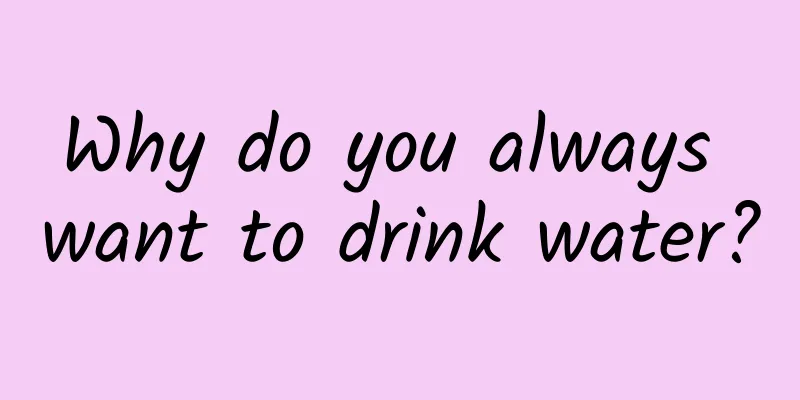Why do you always want to drink water?

|
Everyone knows that water is vital to human life. Medically speaking, drinking a certain amount of water every day is good for the body, but too much or too little is not good. But why do some people want to drink water all the time? If you sweat too much, you will become dehydrated. You need to replenish water in time. You can add a little salt to the water. But if you don’t sweat too much and still want to drink water, you should consider a pathological problem. 1. Severe lack of water in the human body: Hot weather, heavy physical labor, blood loss, burns, vomiting, diarrhea, heavy sweating due to high temperature, etc. can all lead to severe lack of water in the human body and unbearable thirst, and then the following symptoms often appear, namely: dry mouth, haggard face, sunken eye sockets, and dry skin that cannot stretch. In fact, thirst is the body's own unique protective mechanism that protects it from dehydration. When you feel thirsty, your body naturally needs to replenish a lot of water. Once the body's water balance is restored, this "protective" thirst disappears. 2. Diabetes is the culprit: One of the functions of hormones is to coordinate the metabolism of water and salt in the human body. Once the balance of this hormone is disrupted, it can cause constant thirst. High blood sugar levels in diabetic patients can cause a sharp increase in urine output. At this time, even if they drink a lot of water, they will still feel unbearable thirst. If a diabetic patient continues to feel thirsty while taking insulin or glucose-lowering medication, this indicates that his or her condition is worsening. If this happens, you should go to the hospital to check your blood sugar and start taking glucose-lowering medication immediately. 3. Brain injury: Some people also experience thirst after brain injury or neurosurgery. Its characteristics are: acute onset, often fatal within a day or even an hour. At this time, diabetes insipidus worsens. Patients should drink 10 or even 20 liters of water every day. It turns out that this is entirely because the patient's body lacks the so-called "urination-restricting hormone". Because the onset is acute, you should see a neurologist immediately. 4. Excess hormones: The primary symptom of hyperthyroidism is also thirst. Excess hormones cause patients to experience tooth loss, bone pain, rapid fatigue, muscle weakness, and rapid weight loss. Calcium lost from bones can even turn urine white. At this time, you should consult an endocrinologist as soon as possible. 5. Kidney disease: The kidneys have lost the ability to retain water, resulting in a large amount of water being needed. There are many types of kidney disease, among which pyelonephritis, glomerulonephritis, hydronephrosis, etc. can cause thirst. It is characterized by a feeling of thirst even when urine output decreases and edema occurs. The thirst that occurs in this case indicates renal insufficiency. Unfortunately, this extremely dangerous phenomenon is often not discovered in time. By the time it is discovered, it is already too late, and the patient can only rely on hemodialysis or kidney transplantation to prolong his life. Therefore, paying attention to thirst in time will protect your kidneys from further damage. At this time, it is very important to consult a nephrologist. 6. Improper use of medication: Improper use of medication often causes thirst. For example, some blood pressure medications often cause dry mouth. Therefore, patients need to drink plenty of water. Drinking lots of water can be harmful to people with high blood pressure. At this time, you should consult a cardiologist and change the diuretic. 7. Unexplained thirst: This is a very annoying disease. Most people who suffer from this disease are women. Its characteristics are: in addition to inexplicable thirst, patients also show willfulness, anger and aggressiveness. If this happens, the patient may try to trick his or her body, such as holding up a glass of water and swallowing several times in a row. Or scoop a cup of salty sea water and pretend to take a gulp. If the water is clean, you can also use it to moisten your lips. These "tricks" are enough to deceive the patient's brain, making him feel a sense of thirst-quenching pleasure for a period of time. |
<<: What causes the tongue to become larger?
>>: What diseases will you get if you don't drink water often?
Recommend
What is the specific medicine for urticaria?
The disease of urticaria can actually be treated,...
The efficacy and function of white flower ye
White flowered gentian is a green plant of the ge...
What causes half of the face to be paralyzed?
Many patients will have this feeling: everything ...
Adverse reactions to laser hair removal
You may not know much about what laser hair remov...
How to treat hemorrhoids in the early stage, how to treat hemorrhoids
Hemorrhoids have a serious impact on people's...
How long does it take to treat asthenospermia?
Asthenospermia refers to the poor quality of male...
What to do if the surgical wound is red, swollen and painful
Surgery will leave a wound, which requires timely...
What can I eat if I have a broken rib?
Rib fractures are actually very common in our dai...
Can vinegar be used to wash vulvar itching?
People will inevitably deal with diseases in thei...
How to quickly eliminate bruises from injections
Injections are mainly a medical treatment for col...
Tips for stopping sweating when you are nervous
Although sweating is normal and is a way to detox...
What is the procedure for transferring frozen embryos?
As the number of diseases increases, and many dis...
What is fetal bilateral choroid plexus cyst?
Choroid plexus cyst refers to small cysts with a ...
What causes dry and itchy eyes?
Eyes are a very important organ in our human body...
The efficacy of boiling mulberry leaves and black beans in water
Mulberry leaves and black beans are both foods wi...









